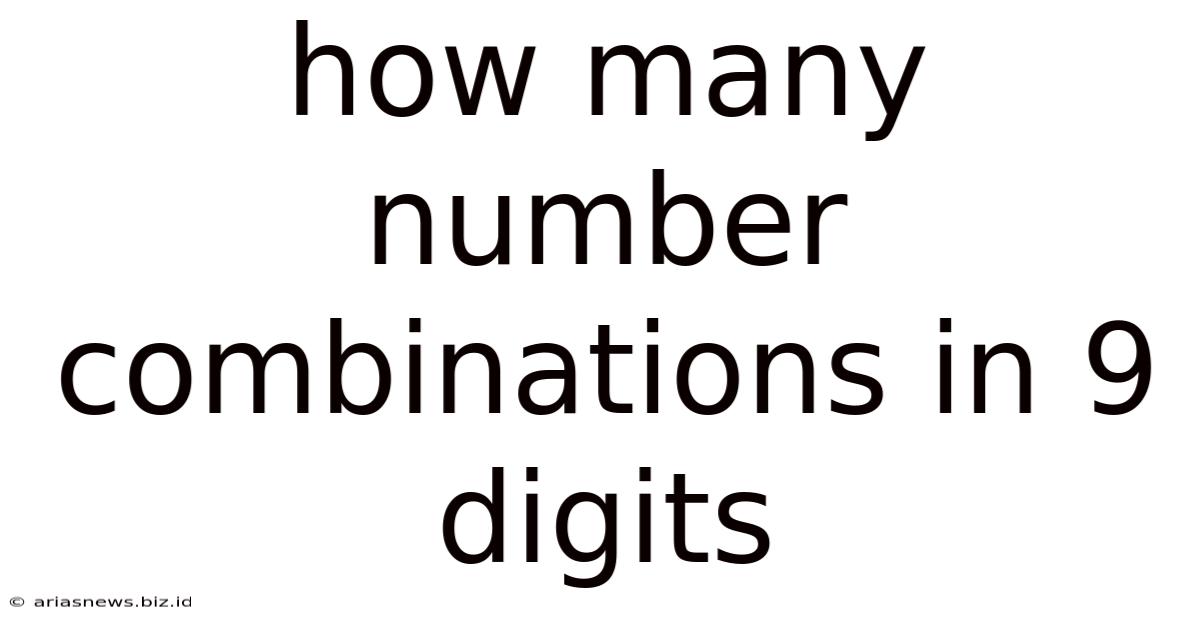How Many Number Combinations In 9 Digits
Arias News
Apr 24, 2025 · 4 min read

Table of Contents
- How Many Number Combinations In 9 Digits
- Table of Contents
- How Many Number Combinations in 9 Digits? Exploring Permutations and Combinations
- Understanding Permutations and Combinations
- Scenario 1: Permutations with Repetition Allowed
- The Fundamental Counting Principle
- Scenario 2: Permutations without Repetition Allowed
- Calculating Permutations without Repetition
- Scenario 3: Combinations with Repetition Allowed
- Scenario 4: Combinations without Repetition Allowed
- The Impact of Leading Zeros
- Practical Applications and Further Exploration
- Latest Posts
- Related Post
How Many Number Combinations in 9 Digits? Exploring Permutations and Combinations
Determining the number of possible combinations in a 9-digit number sequence depends heavily on whether repetition of digits is allowed and whether the order of the digits matters (permutations) or not (combinations). Let's explore both scenarios in detail.
Understanding Permutations and Combinations
Before diving into the calculations, it's crucial to understand the difference between permutations and combinations.
-
Permutations: Permutations are arrangements of objects where the order matters. For example, 123 is considered a different permutation from 321.
-
Combinations: Combinations are selections of objects where the order does not matter. 123 is considered the same combination as 321.
Scenario 1: Permutations with Repetition Allowed
This scenario represents the most straightforward case. We have 9 positions to fill, and for each position, we have 10 choices (digits 0-9). Since repetition is allowed, the choice for each position is independent of the others. Therefore, we can use the fundamental counting principle.
The Fundamental Counting Principle
The fundamental counting principle states that if there are 'm' ways to do one thing and 'n' ways to do another, there are m * n ways to do both. Extending this to our 9-digit number problem:
- Position 1: 10 choices (0-9)
- Position 2: 10 choices (0-9)
- Position 3: 10 choices (0-9)
- ...and so on until Position 9.
Therefore, the total number of permutations with repetition allowed is:
10 * 10 * 10 * 10 * 10 * 10 * 10 * 10 * 10 = 10<sup>9</sup> = 1,000,000,000
There are one billion possible 9-digit number combinations when repetition is allowed.
Scenario 2: Permutations without Repetition Allowed
This scenario is more complex. We still have 9 positions to fill, but once we've chosen a digit for a position, we cannot use that digit again.
Calculating Permutations without Repetition
This calculation uses the concept of factorials. A factorial (denoted by !) is the product of all positive integers up to a given number. For example, 5! = 5 * 4 * 3 * 2 * 1 = 120.
For our 9-digit number without repetition, we have:
- Position 1: 10 choices (0-9)
- Position 2: 9 choices (remaining digits)
- Position 3: 8 choices (remaining digits)
- ...and so on until Position 9: 2 choices (remaining digits).
This can be expressed as a permutation: <sub>10</sub>P<sub>9</sub> or 10! / (10-9)! = 10! / 1! = 10!
Calculating 10!:
10! = 10 * 9 * 8 * 7 * 6 * 5 * 4 * 3 * 2 * 1 = 3,628,800
There are 3,628,800 possible 9-digit number permutations without repetition allowed. Notice that this number is significantly smaller than the number of permutations with repetition.
Scenario 3: Combinations with Repetition Allowed
Combinations, unlike permutations, disregard the order of the digits. This scenario is significantly more complex and requires a different approach, utilizing combinations with repetition. The formula for combinations with repetition is:
(n + r - 1)! / (r! * (n - 1)!)
Where:
- 'n' is the number of types of items to choose from (in our case, 10 digits).
- 'r' is the number of items we are choosing (in our case, 9 digits).
Plugging in our values:
(10 + 9 - 1)! / (9! * (10 - 1)!) = 18! / (9! * 9!)
This calculation is quite large, but after simplification, we get:
48,620
Scenario 4: Combinations without Repetition Allowed
This scenario is theoretically possible but practically nonsensical. We're trying to choose 9 digits out of 10 without repetition and ignoring the order. This essentially boils down to choosing which one of the 10 digits not to include. Therefore there are only 10 such combinations.
The Impact of Leading Zeros
It's important to consider the impact of leading zeros. If we exclude numbers with leading zeros, the calculations become significantly more complex. For example, in the permutations with repetition case, we would need to subtract the number of combinations starting with zero. This requires sophisticated combinatorial techniques or iterative computational methods to solve accurately.
Practical Applications and Further Exploration
Understanding these different permutations and combinations has many practical applications, including:
- Cryptography: Analyzing the strength of encryption algorithms.
- Probability and Statistics: Calculating probabilities of events.
- Lottery Calculations: Determining the chances of winning lottery games.
- Password Security: Evaluating the strength of passwords.
- Data Science and Machine Learning: Exploring the various possible outcomes in algorithms.
This detailed exploration hopefully clarifies the considerable differences between the various scenarios. Remember to carefully define the constraints of your problem (repetition allowed, order matters, leading zeros allowed) before attempting calculations. Choosing the correct method is critical to obtaining the accurate answer. For extremely large numbers, consider using mathematical software or programming tools to assist with the calculations. The world of permutations and combinations is vast, and this is just a small glimpse into its complexities. Further exploration into advanced combinatorial techniques will reveal more sophisticated ways of tackling these problems, especially those involving restrictions or limitations beyond the simple scenarios discussed here.
Latest Posts
Related Post
Thank you for visiting our website which covers about How Many Number Combinations In 9 Digits . We hope the information provided has been useful to you. Feel free to contact us if you have any questions or need further assistance. See you next time and don't miss to bookmark.